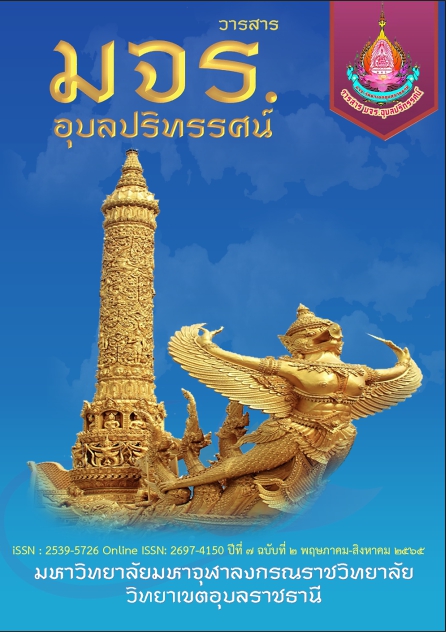THE AFFECTING OF GUIDELINES FOR DEVELOPING DIGITAL LEADERSHIP AND ONLINE TEACHING SKILLS ON SCHOOL EFFECTIVENESS
Main Article Content
Abstract
The objectives of this research are to 1) to study the influent factors in terms of personal characteristic, digital leadership, online teaching skill and school effectiveness and 2) study the relationship of these variables or concepts. The researcher collected the quantitative data from 436 respondents of administrators and teachers secondary education service area office, 28, Srisaket and Yasotorn province. The analysis results of and 5 experts’ opinion were combined and concluded as follows: 1) The personal factors such as education level, income and working experience, and social media usage (Line, YouTube, Facebook, and usage frequency, influenced significantly on digital leadership and online teaching skill at .05.2) Digital leadership related significantly in the same direction at high level to online teaching skill and school effectiveness, r = .88 and .88 (sig .01), respectively. Besides, online teaching skill also related highly and significantly in the same direction to school effectiveness at r = .94 (Sig .001).
Article Details
References
กัลยา วานิชย์บัญชา. (2551). การวิเคราะห์สถิติขั้นสูงด้วย SPSS for Window, พิมพ์ครั้งที่ 6, กรุงเทพมหานคร, ศูนย์หนังสือแห่งจุฬาลงกรณ์มหาวิทยาลัย.
ธีรเดช ฉายอรุณ. (2540). ข้อตกลงในการทดสอบ MANOVA และ Discriminant analysis สาระสำคัญ การทดสอบและแนวทางการแก้ไข, วารสารวิธีวิทยาการวิจัย, 10(2), 47-63.
ไพฑูรย์ สุขศรีงาม. (2557). หลักการใช้การวิเคราะห์ความแปรปรวนหลายตัวแปร, วารสารวิชาการการจัดการเทคโนโลยีสารสนเทศและนวัตกรรม, 1(1), 7-13.
วรภัทร์ ภู่เจริญ. (2020) เด็กคือยอด ผู้ใหญ่คือราก, https://facebook.com/woraphatFC
สำนักงานเขตพื้นที่การศึกษามัธยมศึกษา เขต 28. (2563). รายงานผลการทดสอบการศึกษาระดับชาติขั้นพื้นฐาน ปีการศึกษา 2562, https://www.secondary28.go.th/?p=2475
Ahrens, R., Lirani, L., & Francisco, C. (2020). Construct validity and reliability of the work environment assessment instrument WF-10, International Journal of environmental Research and Public Health, 1-12.
Bagozzi, R.P., Yi, Y., & Phillips, L.W. (1991). Assessing construct validity in organization research, Administrative Science Quarterly, 36(3), 421-458.
Chaeawangkham, E., & Ariratana, W. (2021). Digital leadership of schools administration under the Udon Thani primary education area 4, 22nd NGRC, 886-893.
Oraif, I., & Elyas, T. (2021). The impact of covid-19 on learning; investigating EFL learning engagement in online course in Saudi Arabia, Edu, Sci., 11(99).
Patel, P. (2009). Introduction to quantitative methods, Empirical Law Seminar.
Saleem, F., Naseem, Z., Ibrahim, K., Hussain, A., & Azeem, M. (2012). Determinants of school effectiveness: a study at Punjab level, International Journal of Humanities and Social Science, 2(14), 242-251
Suksaen, K., & Trirat, P. (2021). Digital leadership development model for school administrations of Saint Gabriel' foundation in Thailand, Journal of Social Science and Buddhistic Anthroplogy, 6(7), 129-146.
Suwannatthachote, P. (2018). Online instructor competencies and roles: instructor presence and learner support, Journal of Graduate Studies Valaya Alongkorn Rajabhat University, 12(2), 244-256.
Vijayamohanan, P.N., & Rjumohan (2020). A. (2020). Reliability, validity and uni-dimensionality: a primer, MPRA.
Visser, L., Visser, Y.L., Amirault, R. & Simonson, M. (2012). Trends and Issues in Distance Education: International Perspectives (2nd edition). 2012, Information Age Publishers
Wayo, W., Charoennukul, Kankaynat, C., & Konyai, J. (2020). Online learning under the covid-19 epidemic: concepts and applications of teaching and learning management, Regional Health Promotion Center 9 Journal, 14(34), 285-298.
Wichaiwong, T. & Yupas, Y. (2019). New leadership and organizational management skills, Saeng Isan Academic Journal, 16(2), 667-680.

